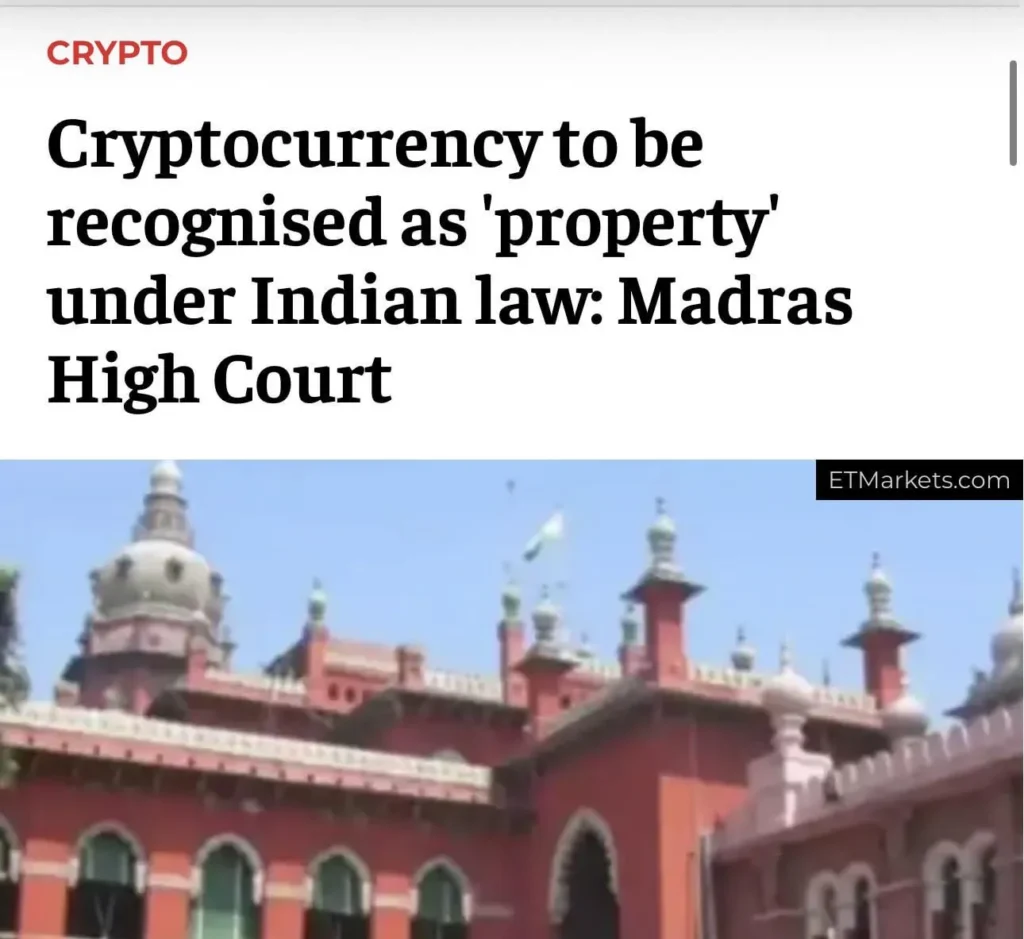Cryptocurrency Recognized as ‘Property’ Under Indian Law, Declares Madras High Court
In a groundbreaking judgment, the Madras High Court in India has officially classified cryptocurrencies as “property” under Indian law. This pivotal decision comes amidst ongoing deliberations and uncertainties surrounding the legal status of digital currencies in India. The ruling, which was detailed in an extensive judgment related to a case involving economic offenses, clarifies and potentially reshapes the approach towards the treatment of cryptocurrencies in Indian judicial processes.
Context of the Judgment
The Madras High Court was dealing with a case where the petitioner was accused of misappropriating cryptocurrencies amongst other assets. The lack of legal clarity on cryptocurrencies has often led to challenges in prosecuting cases involving digital assets. By categorizing cryptocurrencies as property, the court has now afforded legal protection to these assets, making them subject to the laws applicable to property rights and transactions in India.
Legal Implications of the Ruling
The classification of cryptocurrencies as property implies that they can now be considered as an asset that can be owned, transferred, or inherited in compliance with Indian law. This recognition is crucial for several reasons:
- Recovery and Restitution: Victims of theft or fraud involving cryptocurrencies may have a more straightforward pathway to claim restitution, as digital currencies are now recognized as recoverable assets.
- Inheritance and Taxation: Just like any other property, cryptocurrencies can now be inherited, and are likely to be subjected to taxes such as capital gains tax, depending on the regulation policies the government may decide to enact.
- Contractual and Commercial Transactions: Parties can enforce contracts involving cryptocurrencies since these digital assets now have legal backing as property, affording them protection similar to any other valuable asset.
Economic and Regulatory Impact
This decision by the Madras High Court could lead to a significant shift in the economic and regulatory landscape concerning digital currencies in India. It could prompt legislative bodies to expedite the process of creating a comprehensive legal framework governing the use, trading, and overall management of cryptocurrencies in India.
The recognition could also boost investor confidence, as it removes a layer of legal uncertainty that has historically plagued the crypto market in India. Businesses and startups may feel more secure in integrating cryptocurrencies into their operational models, driving innovation and potentially increasing India’s stake in the global digital economy.
Challenges Ahead
While the ruling provides a clear classification of cryptocurrencies, it also opens up a realm of regulatory challenges:
- Regulatory Oversight: With cryptocurrencies classified as property, regulatory authorities such as the Securities and Exchange Board of India (SEBI) or a new dedicated body might need to draft and enforce rules concerning the protection, trade, and ownership of cryptocurrencies.
- Legal Frameworks: Existing laws governing property transactions, fraud, inheritance, and taxes may require amendments to address the unique attributes of cryptocurrencies and ensure their effective management.
Concluding Thoughts
The Madras High Court’s decision to recognize cryptocurrencies as property under Indian law marks a significant milestone in the legal landscape of digital currencies in the country. It aligns India with several other nations that have been finding ways to integrate cryptocurrencies within their legal and economic systems effectively.
Moving forward, it is crucial for stakeholders, including legislators, legal experts, and the crypto community, to work collaboratively to develop tailored regulatory frameworks. Such efforts will ensure that this new digital asset class can contribute positively to India’s economy while safeguarding the interests of all parties involved.








